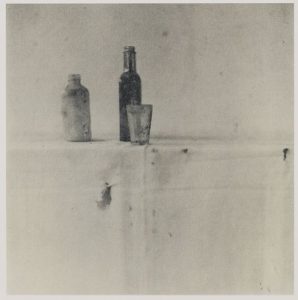Without knocking
by Attila József
If I grow to love you
you can come in
without knocking
but consider carefully
I will lay you on my sack of hay
where the rustling straw sighs with dust
I will bring you fresh water in a jug,
before you leave, I’ll clean your shoes
nobody will bother us here
you can bend mending our clothes in peace
Deep silence is deep here, just so you know
if you’re tired, you can have my only chair,
if it’s hot, you can undo ties and collars
if you’re hungry, you’ll have a clean paper as plate
when there’s something else
please let me have some of it
I’m also forever hungry
If I grow to love you
you can come in
without knocking
but consider carefully
I would be sad if afterwards
you forgot to visit me.
1926
translated by Fanni Sütő
Kopogtatás nélkül (Hungarian)
Ha megszeretlek, kopogtatás nélkül
bejöhetsz hozzám,
de gondold jól meg,
szalmazsákomra fektetlek,
porral sóhajt a zizegő szalma.
A kancsóba friss vizet hozok be néked,
cipődet, mielőtt elmégy, letörlöm,
itt nem zavar bennünket senki,
görnyedvén ruhánkat nyugodtan foltozhatod.
Nagy csönd a csönd, néked is szólok,
ha fáradt vagy, egyetlen székemre leültetlek,
melegben levethesz nyakkendőt, gallért,
ha éhes vagy, tiszta papirt kapsz tányérul,
amikor akad más is,
hanem akkor hagyj nékem is,
én is örökké éhes vagyok.
Ha megszeretlek, kopogtatás nélkül
bejöhetsz hozzám,
de gondold jól meg,
bántana, ha azután sokáig elkerülnél.
Under the skin a faint shadow
by Attila József
A translucent lion lives within dark walls,
in my heart I wear freshly pressed clothes when I address you,
I mustn’t think of you, there is a job to do
You’re dancing
I don’t have my daily bread and I still have long to live
It’s been 5 weeks that I heard no news of you
Time had run away on blood-red wooden feet,
roads huddle together under the snow.
I do not know if one can love you?
Silent black men play chess
to win your words from a long time ago.
1927
translated by Fanni Sütő
József Attila: A bőr alatt halovány árnyék
Egy átlátszó oroszlán él fekete falak között,
szívemben kivasalt ruhát hordok amikor megszólítlak
nem szabad hogy rád gondoljak munkám kell elvégeznem,
te táncolsz,
nincsen betevő kenyerem és még sokáig fogok élni,
5 hete, hogy nem tudom mi van veled
az idő elrohant vérvörös falábakon
az utak összebújnak a hó alatt,
nem tudom, hogy szerethet-e téged az ember?
néma négerek sakkoznak régen elcsendült szavaidért.
A winter poem
by Miklós Radnóti
May peace be with everyone now
harmless old men walk
in the mud of the first snow and die
before the arrival of the dawn.
Snow, snow! the sky shines darkly
in black eyes and bad
sadness cries under the lamps
and the conceiving curse
of pregnant women flies from moon-lit
puddles towards the man.
Winter, winter! the child is afraid
and the weak flower, raised in the greenhouse
by handsome hands, is afraid too
the trouble of mothers moved
to the eaves and it whines and whines:
the first snow has fallen
mercy and peace, may peace
be with everyone already.
translated by Fanni Sütő
Radnóti Miklós: Téli vers
Béke legyen most mindenkivel:
jámbor öregek járnak az
első hó sarában és meghalnak
mire megjön a hajnal.
Hó, hó! fekete szemekben
sötéten fénylik az ég, rossz
bánat sír a lámpák alól és
száll elárvult terhes asszonyok
foganó átka, holdas
pocsolyákból a férfi felé.
Tél, tél! fél most a gyerek s
fél az üvegesházban markos
marokkal nevelt gyönge virág;
az anyák gondja kiköltözött
az ereszekre, és sipog, sipog:
leesett már az első hó
irgalom és béke, béke legyen
már mindenkivel.
